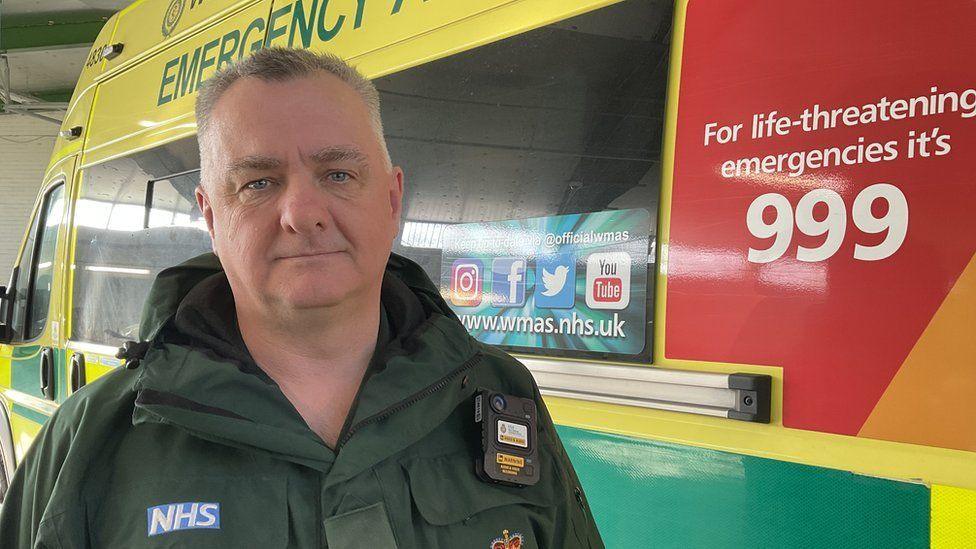If anyone can source the BBC report that was on TV yesterday (and is the actual prompt for this thread), it would be much appreciated. I'm on my phone right now so forgive the links as I am sure better can be found with the quick scroll capabilities a mouse provides.
Regardless, this is an issue that I have found that I care deeply about ever since first knowing about it via an A&E (accident and emergency) visit to hospital at 2am on a Saturday night where I saw the level of aggression and threats the staff had to deal with as well as having to essentially stop a male nurse from being attacked (stepping in "de-escalating"). That was about 15yrs ago and at the time I had known of this type of thing, but seeing it at I guess the peak time in a weeks' cycle first hand (night clubbers and raucous drunks etc), really brought home how bad it was for people who are there to help and doing their jobs.
According to reports, things are far worse now than back then and the BBC report yesterday caught me off guard as the segment came on at a point where the TV was background noise. BBC News (601) for anyone who might have seen it.
Pertaining to the same issue, here are a few links:
Almost 45,000 assaults were recorded by ambulance services across England over the last five years, with staff saying they had been punched, kicked, threatened with weapons and subjected to racist, homophobic and religious abuse.
Paramedic Nutan Patel-West, 41, said she had been racially abused "multiple times" while on shift and, during one call-out in 2021, narrowly avoided serious injury after a glass ashtray was hurled at her.
The government said there was a "zero-tolerance approach to this type of behaviour" and warned that those who assault emergency workers can face up to two years in prison.
www.bbc.co.uk/news/articles/crmzy2lgmr7o.amp
"Spitting is the lowest, most disgusting and most disrespectful thing you can do – not to mention the fear of infection risk. It's worse than being punched."
James, 26, a paramedic with London Ambulance Service (LAS), is not alone in facing assaults while on the job.
According to LAS, 739 physical assaults have occurred on staff between January and November this year, 40% of which involved drugs or alcohol.
To try and protect staff, LAS has introduced body-worn cameras, which frontline staff can turn on if they feel threatened or at risk of violence, aggression or abuse.

00:28
Media caption,
Watch: A patient spits in the face of paramedic
James has made that decision on two separate occasions; one incident shows a patient becoming aggressive and spitting at both James and his crewmate, while a second incident shows a female patient attacking him.
"She threatened to smash our faces in and found a scoop to throw at us and then a bin," recalls James.
"You just don't feel safe in a situation like that. You can see from the video, I had been so close to her trying to calm her."
In both cases the recordings led to the perpetrators being prosecuted.
https://www.bbc.co.uk/news/articles/c20n6r1lz58o
An ambulance service said it has seen an "appalling" 89% increase in assaults on its staff over the past five years.
West Midlands Ambulance Service (WMAS) said the number of physical assaults on staff rose from 472 in 2019/20 to 640 in 2023/24. Meanwhile, verbal assaults soared from 768 to 1708 over the same period.
The service is highlighting the abuse as part of a campaign to enable staff to work without fear of attack.
"This sort of abuse can have a profound impact on their lives, with some staff never recovering and actually leaving the service," said chief executive Anthony Marsh.
"Given our staff are there to help people in their hour of need, it is appalling," he added.
The service said alcohol was the most prominent inciting factor, followed by drugs and mental health crises.
Assaults on staff members' race and sexuality were increasingly common, it added, and there had also been threats of death and rape made to 999 call assessors.

Image caption,
Steve Raven was one of 608 West Midlands Ambulance Service workers who were physically assaulted between 2021 and 2022
Paramedic Steve Raven was attacked in Leominster, Herefordshire, in March 2022. A male patient became aggressive and punched him, leaving him with a broken jaw.
His assailant was jailed and Mr Raven has since returned to work, but said the attack left him traumatised.
"I am still medicated for anxiety and attend counselling," he said. "At the time I thought I was going to die.
"I was there to be helpful and he ended up putting me in hospital... Every day to go to work is always a tough thing to do, but I still want to do my job."
Mr Marsh called for public support to make such abuse "unacceptable".
"Equally, we need the support of the courts to make it absolutely clear that such abuse will not be accepted and severe punishments will be handed down to those who attack our staff," he added.
The Association of Ambulance Chief Executives is highlighting the impact of abuse on the everyday lives of staff as part of a "work without fear" campaign.
Managing director Anna Parry said it was a sad fact ambulance workers faced "the very real possibility of violence, aggression and abuse" every day.
https://www.bbc.co.uk/news/articles/c51ylr146pjo
The other articles continue along the same lines. Imagine being a paramedic and having to worry about being attacked whilst there to offer assistance. Outside of psychosis, can this behaviour be excused? My question is also why are the sentences for attacking medical professionals so weak?
Do we have any on here who encounter this sort of thing? If so, what is your opinion on it and what changes can be made to better protect you?
Regardless, this is an issue that I have found that I care deeply about ever since first knowing about it via an A&E (accident and emergency) visit to hospital at 2am on a Saturday night where I saw the level of aggression and threats the staff had to deal with as well as having to essentially stop a male nurse from being attacked (stepping in "de-escalating"). That was about 15yrs ago and at the time I had known of this type of thing, but seeing it at I guess the peak time in a weeks' cycle first hand (night clubbers and raucous drunks etc), really brought home how bad it was for people who are there to help and doing their jobs.
According to reports, things are far worse now than back then and the BBC report yesterday caught me off guard as the segment came on at a point where the TV was background noise. BBC News (601) for anyone who might have seen it.
Pertaining to the same issue, here are a few links:
- 4 December 2024
Almost 45,000 assaults were recorded by ambulance services across England over the last five years, with staff saying they had been punched, kicked, threatened with weapons and subjected to racist, homophobic and religious abuse.
Paramedic Nutan Patel-West, 41, said she had been racially abused "multiple times" while on shift and, during one call-out in 2021, narrowly avoided serious injury after a glass ashtray was hurled at her.
The government said there was a "zero-tolerance approach to this type of behaviour" and warned that those who assault emergency workers can face up to two years in prison.
www.bbc.co.uk/news/articles/crmzy2lgmr7o.amp
"Spitting is the lowest, most disgusting and most disrespectful thing you can do – not to mention the fear of infection risk. It's worse than being punched."
James, 26, a paramedic with London Ambulance Service (LAS), is not alone in facing assaults while on the job.
According to LAS, 739 physical assaults have occurred on staff between January and November this year, 40% of which involved drugs or alcohol.
To try and protect staff, LAS has introduced body-worn cameras, which frontline staff can turn on if they feel threatened or at risk of violence, aggression or abuse.

00:28
Media caption,
Watch: A patient spits in the face of paramedic
James has made that decision on two separate occasions; one incident shows a patient becoming aggressive and spitting at both James and his crewmate, while a second incident shows a female patient attacking him.
"She threatened to smash our faces in and found a scoop to throw at us and then a bin," recalls James.
"You just don't feel safe in a situation like that. You can see from the video, I had been so close to her trying to calm her."
In both cases the recordings led to the perpetrators being prosecuted.
https://www.bbc.co.uk/news/articles/c20n6r1lz58o
An ambulance service said it has seen an "appalling" 89% increase in assaults on its staff over the past five years.
West Midlands Ambulance Service (WMAS) said the number of physical assaults on staff rose from 472 in 2019/20 to 640 in 2023/24. Meanwhile, verbal assaults soared from 768 to 1708 over the same period.
The service is highlighting the abuse as part of a campaign to enable staff to work without fear of attack.
"This sort of abuse can have a profound impact on their lives, with some staff never recovering and actually leaving the service," said chief executive Anthony Marsh.
"Given our staff are there to help people in their hour of need, it is appalling," he added.
The service said alcohol was the most prominent inciting factor, followed by drugs and mental health crises.
Assaults on staff members' race and sexuality were increasingly common, it added, and there had also been threats of death and rape made to 999 call assessors.

Image caption,
Steve Raven was one of 608 West Midlands Ambulance Service workers who were physically assaulted between 2021 and 2022
Paramedic Steve Raven was attacked in Leominster, Herefordshire, in March 2022. A male patient became aggressive and punched him, leaving him with a broken jaw.
His assailant was jailed and Mr Raven has since returned to work, but said the attack left him traumatised.
"I am still medicated for anxiety and attend counselling," he said. "At the time I thought I was going to die.
"I was there to be helpful and he ended up putting me in hospital... Every day to go to work is always a tough thing to do, but I still want to do my job."
Mr Marsh called for public support to make such abuse "unacceptable".
"Equally, we need the support of the courts to make it absolutely clear that such abuse will not be accepted and severe punishments will be handed down to those who attack our staff," he added.
The Association of Ambulance Chief Executives is highlighting the impact of abuse on the everyday lives of staff as part of a "work without fear" campaign.
Managing director Anna Parry said it was a sad fact ambulance workers faced "the very real possibility of violence, aggression and abuse" every day.
https://www.bbc.co.uk/news/articles/c51ylr146pjo
The other articles continue along the same lines. Imagine being a paramedic and having to worry about being attacked whilst there to offer assistance. Outside of psychosis, can this behaviour be excused? My question is also why are the sentences for attacking medical professionals so weak?
Do we have any on here who encounter this sort of thing? If so, what is your opinion on it and what changes can be made to better protect you?
